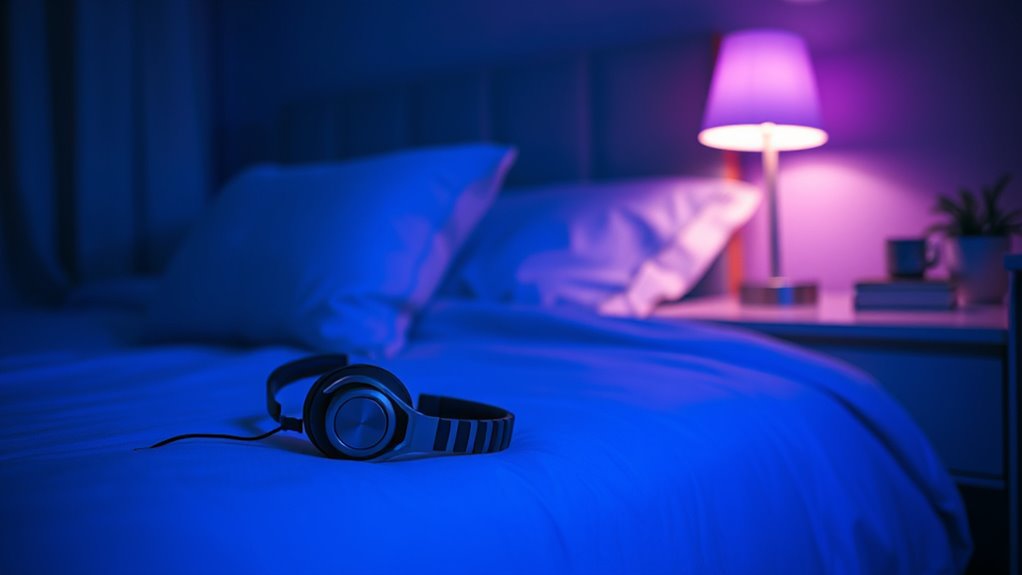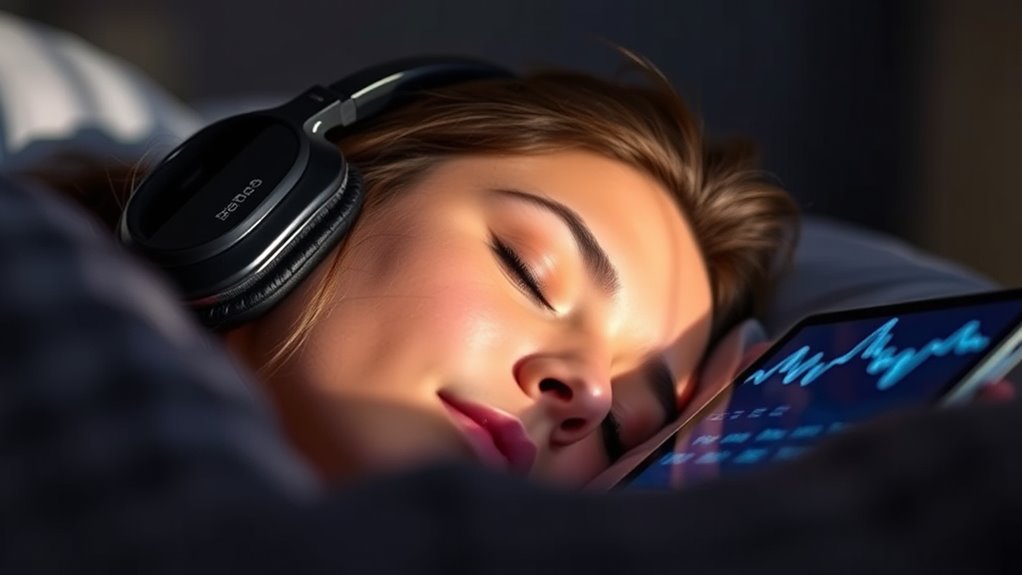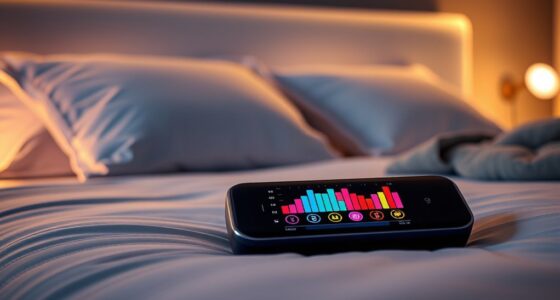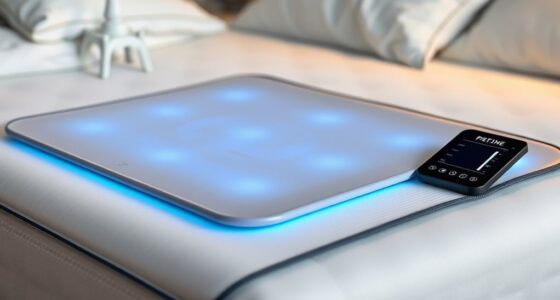Binaural beats are based on the idea that listening to different frequencies in each ear can help your brain enter restful states, potentially improving sleep. While some studies suggest they influence brain activity and relaxation, scientific opinions are divided, and individual results vary. They’re a safe, drug-free option that many find helpful when used regularly. To discover if binaural beats can truly support your sleep, keep exploring how they work and what others experience.
Key Takeaways
- Scientific evidence on binaural beats improving sleep is mixed, with some studies showing potential benefits and others remaining inconclusive.
- They may promote relaxation and facilitate sleep by entraining brainwaves to delta frequencies, but effects vary among individuals.
- Binaural beats are a safe, non-invasive tool that can complement good sleep hygiene practices.
- Their effectiveness depends on consistent use, individual brain response, and proper listening conditions.
- Overall, binaural beats are a promising, low-cost option but not a guaranteed solution for sleep issues.

If you struggle to fall asleep or stay asleep, binaural beats might offer a simple, natural solution. These auditory stimuli work by presenting two different frequencies to each ear, creating a perceived third tone that your brain interprets. This process, known as neural entrainment, can influence your brainwave activity, nudging it toward states associated with relaxation and sleep. When you listen to binaural beats, your brain tends to synchronize with the beat’s frequency, promoting a shift from alertness to calmness. This effect is rooted in the idea that auditory stimulation can directly impact neural activity, guiding your brain into a more restful state.
Binaural beats help guide your brain into restful, sleep-ready states through neural entrainment and auditory stimulation.
The concept of neural entrainment is key here. It refers to the brain’s natural tendency to align its electrical activity with external rhythmic stimuli. When you hear binaural beats, your brain responds by adjusting its wave patterns to match the beat frequency. For sleep, these frequencies typically fall within the delta range, which is linked to deep, restorative sleep. By consistently listening to beats tuned to this range, you may help your brain transition more smoothly into sleep stages. This isn’t just about relaxing; it’s about actively guiding your brain’s activity through targeted auditory stimulation.
Many people turn to binaural beats because they’re a non-invasive, drug-free way to improve sleep quality. Unlike medications, they don’t carry the risk of side effects, and you can use them anytime, anywhere. You don’t need special equipment—just headphones and a quiet environment. The process is simple: find a comfortable position, put on your headphones, and listen to the beats as you wind down. Over time, this routine can help your brain become more responsive to sleep cues, making it easier to drift off and stay asleep longer.
However, it’s important to recognize that the scientific community remains divided on the effectiveness of binaural beats for sleep. Some studies suggest that auditory stimulation can influence neural activity and promote relaxation, but the results aren’t universally conclusive. The degree of benefit varies from person to person, and factors like individual brain chemistry and expectations can play a role. While binaural beats aren’t a guaranteed fix, many users report feeling calmer and sleeping more soundly after regular practice. It’s a promising, low-risk approach that might complement other sleep hygiene strategies, but it’s wise to keep realistic expectations and see how your body responds.
Frequently Asked Questions
Can Binaural Beats Replace Prescription Sleep Medications?
You might wonder if binaural beats can replace prescription sleep medications. While some find auditory stimulation helpful, it’s important to remember the placebo effect can influence results. Binaural beats may promote relaxation, but they aren’t proven as a complete substitute for medications. Use them as a complementary tool, not a replacement, and consult your doctor for personalized advice on managing sleep issues safely and effectively.
How Quickly Do Binaural Beats Affect Sleep Quality?
You might notice improved sleep quality within minutes of listening to binaural beats, as they promote brainwave synchronization that encourages relaxation. Some people experience a reduction in sleep onset latency, meaning it takes less time to fall asleep. However, effects vary based on individual differences and consistency. To see real benefits, try regular sessions, and be patient—your brain needs time to adapt and modify its sleep patterns effectively.
Are Binaural Beats Safe for Children and Pregnant Women?
Imagine binaural beats as gentle waves in a calm sea. You wonder if they’re safe for children and pregnant women. While some believe they’re harmless, you should prioritize child safety and pregnant health. Without solid research, it’s best to consult a healthcare professional before using binaural beats around children or pregnant women. Protecting their well-being is like steering clear of rough waters—better safe than sorry.
Do Binaural Beats Have Any Side Effects or Risks?
You might wonder if binaural beats have side effects or risks. Generally, they’re safe for most people, but some may experience auditory hallucinations or mild discomfort. There’s also a small concern about dependency if you rely on them excessively for sleep. To stay safe, use them as directed and pay attention to how you feel. If you notice any adverse effects, it’s best to consult a healthcare professional.
Can Binaural Beats Help With Sleep Disorders Like Insomnia?
You might find binaural beats helpful for sleep disorders like insomnia because they use brainwave entrainment as a form of sound therapy. By listening to specific frequencies, you can potentially stimulate your brain to enter states conducive to sleep. While research is ongoing, many people report improved sleep quality with consistent use, making binaural beats a promising, non-invasive option for managing sleep difficulties.
Conclusion
So, are binaural beats a miracle for sleep? While some swear by their calming power, scientific evidence remains mixed—like chasing a rainbow that might not exist. Don’t expect them to solve all your sleep woes overnight, but if you give them a try, you might find your nights transforming from chaos into peaceful seas. Think of binaural beats as a gentle lullaby, guiding you into a restful sleep, even if they’re not a guaranteed magic wand.









